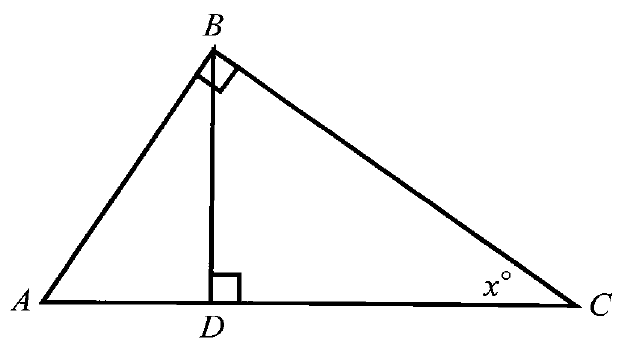LINEAR PAIR POSTULATE
If two angles form a linear pair, then they are supplementary.
* supplementary means sums to 180.
* linear pair means they form a line.
Example 1 :
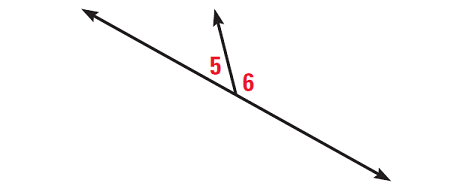
In the above diagram, there is only one linear pair. That is
Angle 5 and angle 6
So,
m∠5 + m∠6 = 180°
Example 2 :
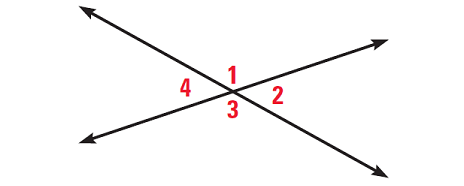
In the above diagram, the linear pairs are
Angle 1 and angle 2
Angle 2 and angle 3
Angle 3 and angle 4
Angle 4 and angle 1
So,
m∠1 + m∠2 = 180°
m∠2 + m∠3 = 180°
m∠3 + m∠4 = 180°
m∠4 + m∠1 = 180°
Linear Pair Perpendicular Theorem
If two lines form a linear pair of angles having equal measure, then the lines are perpendicular.
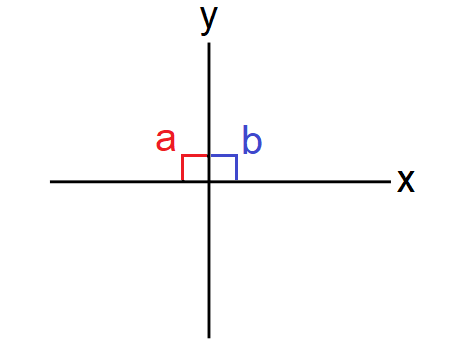
In the diagram above, angles 'a' and 'b' are linear pair and having equal measure (= 90°). So, the lines 'x' and 'y' are perpendicular.
Solved Problems
Problem 1 :
In the diagram shown below, solve for x and y. Then, find the angle measures.
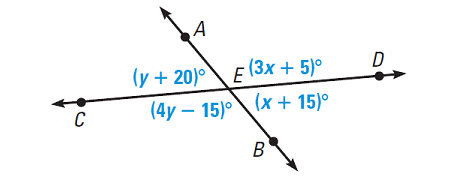
Solution :
Use the fact that the sum of the measures of angles that form a linear pair is 180°.
Solving for x :
∠AED and ∠DEB form a linear pair.
m∠AED + m∠DEB = 180°
Substitute m∠AED = (3x + 5)° and m∠DEB = (x + 15)°.
(3x + 5)° + (x + 15)° = 180°
Simplify.
4x + 20 = 180
Subtract 20 from each side.
4x = 160
Divide each side by 4.
x = 40
Solving for y :
∠AEC and ∠CEB are a linear pair.
m∠AEC + m∠CEB = 180°
Substitute m∠AEC = (y + 20)° and m∠CEB = (4y - 15)°.
(y + 20)° + (4y - 15)° = 180°
Simplify.
5y + 5 = 180
Subtract 5 from each side.
5y = 175
Divide each side by 5.
y = 35
Use substitution to find the angle measures :
m∠AED = (3x + 5)° = (3 • 40 + 5)° = 125°
m∠DEB = (x + 15)° = (40 + 15)° = 55°
m∠AEC = ( y + 20)° = (35 + 20)° = 55°
m∠CEB = (4y - 15)° = (4 • 35 - 15)° = 125°
So, the angle measures are 125°, 55°, 55°, and 125°. Because the vertical angles are congruent, the result is reasonable.
Problem 2 :
In the stair railing shown at the right, m∠6 has a measure of 130°. Find the measures of the other three angles.
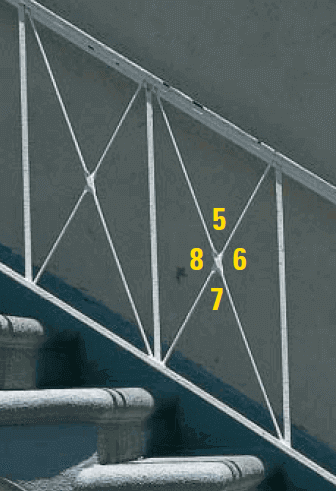
Solution :
In the diagram above, ∠5 and ∠6 form a linear pair.
m∠5 + m∠6 = 180°
Substitute m∠6 = 130°.
m∠5 + 130 = 180°
Subtract 130° from both sides.
m∠5 = 50°
∠6 and ∠7 also form a linear pair. So, it follows that
m∠7 = 50°
∠7 and ∠8 also form a linear pair. So, it follows that
m∠8 = 130°
Therefore,
m∠5 = 50°
m∠7 = 50°
m∠8 = 130°
Kindly mail your feedback to v4formath@gmail.com
We always appreciate your feedback.
©All rights reserved. onlinemath4all.com
Recent Articles
-
Digital SAT Math Problems and Solutions (Part - 144)
Apr 14, 25 07:27 PM
Digital SAT Math Problems and Solutions (Part - 144) -
Quadratic Equation Problems with Solutions (Part - 1)
Apr 14, 25 11:33 AM
Quadratic Equation Problems with Solutions (Part - 1) -
Quadratic Equation Problems with Solutions (Part - 2)
Apr 14, 25 11:22 AM
Quadratic Equation Problems with Solutions (Part - 2)
